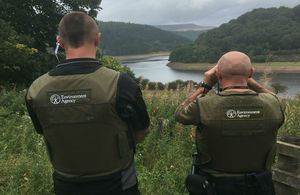Effective use of technology to improve peacekeeping
Mr President, thank you for convening today’s debate. I would like to thank the Secretary-General for his remarks on this subject.
Without peacekeepers there is no peacekeeping. They are our most valuable asset for protecting civilians, championing the rule of law and ultimately paving the way to a durable peace.
Yet, sadly, peacekeepers continue to pay the ultimate price as they conduct their vital work implementing the mandates we set. So far this year, 83 peacekeepers have lost their lives in the service of the UN. It is fitting that this morning we pay tribute to their service.
We must work collectively to ensure peacekeepers’ safety and security – both for their protection and so that they are better empowered to deliver their mandates.
Technology and innovation, supported by thorough training, can enhance the safety and security of all UN personnel.
That is why the UK is proud to partner with India to support initiatives such as ‘Unite Aware.’ This is a technology platform which improves peacekeepers’ situational awareness and information analysis – vital elements in keeping them safe.
Technology such as this, alongside developments in peacekeeping intelligence, helps protect our peacekeepers and support their ability to protect civilians. It contributes to the overall effectiveness of each mission. It provides real operational benefit.
We have seen this on the ground through the UK deployment to MINUSMA. UK troops have gathered intelligence to support mission planning, improve overall mission performance. Recently, UK personnel lead a ‘Cordon and Search’ operation to seize weapons and equipment hidden by terrorists threatening local communities. A first for MINUSMA for some time.
But of course technology is only one part of the challenge of mitigating the risks to peacekeepers. We must also ensure that all peacekeepers are provided training in basic military skills and skills specific to the task. Maintaining and continually improving the knowledge and skills of peacekeepers will have an invaluable impact on casualty reduction.
Comprehensive and mission-specific training is key to understanding and tackling threats. Peacekeepers that have the right skills and training, and the appropriate equipment, are more able to effectively defend themselves against attack.
Through our partnerships with other countries that contribute personnel, the UK provides training in a range of vital areas. This includes counter-IED training, peacekeeping intelligence and public order management.
Mr President, I would also like to highlight the benefits of technology for the environment, including within UN operations.
Climate change remains the biggest collective challenge of our generation. To protect the generations of the future, we must look at all options to curb our emissions.
In 2020, UN peace operations accounted for 42 per cent of the UN system’s carbon footprint. As we have already heard today, we must do better if we are to meet the Secretary-General’s Climate Action Plan targets. That starts with UN action.
For example, the overwhelming majority of MINUSMA’s energy requirements are met through diesel generators. The mission anticipated using 55.8 million litres of fuel last financial year. That’s a 13% increase on the year before.
It is time to look at using alternative renewable energy sources, such as solar. The fact that Mali, and many of the sub-Saharan African countries with large UN missions, are already feeling the impact of climate change should give an even greater sense of urgency.
Mr President, there is an opportunity here, through the effective use of technology, to improve peacekeeping, improve the safety and security of peacekeepers, and improve the health of our planet. We should seize it together.
Thank you.

